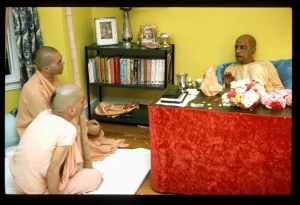CC Madhya 22.120: Difference between revisions
m (1 revision(s)) |
No edit summary |
||
| Line 1: | Line 1: | ||
{{ | [[Category:Sri Caitanya-caritamrta - Madhya-lila Chapter 22|C120]] | ||
<div style="float:left">'''[[Sri Caitanya-caritamrta|Śrī Caitanya-caritāmṛta]] - [[CC Madhya|Madhya-līlā]] - [[CC Madhya 22|Chapter 22: The Process of Devotional Service]]'''</div> | |||
<div style="float:right">[[File:Go-previous.png|link=CC Madhya 22.119|Madhya-līlā 22.119]] '''[[CC Madhya 22.119|Madhya-līlā 22.119]] - [[CC Madhya 22.121|Madhya-līlā 22.121]]''' [[File:Go-next.png|link=CC Madhya 22.121|Madhya-līlā 22.121]]</div> | |||
{{CompareVersions|CC|Madhya 22.120|CC 1975|CC 1996}} | |||
{{RandomImage}} | |||
==== TEXT 120 ==== | ==== TEXT 120 ==== | ||
<div | <div class="verse"> | ||
viṣṇu-vaiṣṇava-nindā, grāmya-vārtā nā śuniba | :viṣṇu-vaiṣṇava-nindā, grāmya-vārtā nā śuniba | ||
prāṇi-mātre mano-vākye udvega nā diba | :prāṇi-mātre mano-vākye udvega nā diba | ||
</div> | </div> | ||
| Line 12: | Line 16: | ||
==== SYNONYMS ==== | ==== SYNONYMS ==== | ||
<div | <div class="synonyms"> | ||
viṣṇu-vaiṣṇava- | ''viṣṇu-vaiṣṇava-nindā''—blaspheming Lord Viṣṇu or His devotee; ''grāmya-vārtā''—ordinary talks; ''nā śuniba''—we should not hear; ''prāṇi-mātre''—to any living entity, however insignificant; ''manaḥ-vākye''—by mind or by words; ''udvega''—anxiety; ''nā diba''—we should not give. | ||
</div> | </div> | ||
| Line 19: | Line 23: | ||
==== TRANSLATION ==== | ==== TRANSLATION ==== | ||
<div | <div class="translation"> | ||
"(18) The devotee should not hear Lord Viṣṇu or His devotees blasphemed. (19) The devotee should avoid reading or hearing newspapers or mundane books that contain stories of love affairs between men and women or subjects palatable to the senses. (20) Neither by mind nor words should the devotee cause anxiety to any living entity, regardless how insignificant he may be. | |||
</div> | </div> | ||
| Line 26: | Line 30: | ||
==== PURPORT ==== | ==== PURPORT ==== | ||
<div | <div class="purport"> | ||
The first ten items are dos and the second ten items are don’ts. Thus the first ten items give direct action, and the second ten items give indirect action. | The first ten items are dos and the second ten items are don’ts. Thus the first ten items give direct action, and the second ten items give indirect action. | ||
</div> | </div> | ||
__NOTOC__ | |||
<div style="float:right; clear:both;">[[File:Go-previous.png|link=CC Madhya 22.119|Madhya-līlā 22.119]] '''[[CC Madhya 22.119|Madhya-līlā 22.119]] - [[CC Madhya 22.121|Madhya-līlā 22.121]]''' [[File:Go-next.png|link=CC Madhya 22.121|Madhya-līlā 22.121]]</div> | |||
__NOTOC__ | |||
__NOEDITSECTION__ | |||
Revision as of 14:52, 11 September 2021

A.C. Bhaktivedanta Swami Prabhupada
TEXT 120
- viṣṇu-vaiṣṇava-nindā, grāmya-vārtā nā śuniba
- prāṇi-mātre mano-vākye udvega nā diba
SYNONYMS
viṣṇu-vaiṣṇava-nindā—blaspheming Lord Viṣṇu or His devotee; grāmya-vārtā—ordinary talks; nā śuniba—we should not hear; prāṇi-mātre—to any living entity, however insignificant; manaḥ-vākye—by mind or by words; udvega—anxiety; nā diba—we should not give.
TRANSLATION
"(18) The devotee should not hear Lord Viṣṇu or His devotees blasphemed. (19) The devotee should avoid reading or hearing newspapers or mundane books that contain stories of love affairs between men and women or subjects palatable to the senses. (20) Neither by mind nor words should the devotee cause anxiety to any living entity, regardless how insignificant he may be.
PURPORT
The first ten items are dos and the second ten items are don’ts. Thus the first ten items give direct action, and the second ten items give indirect action.